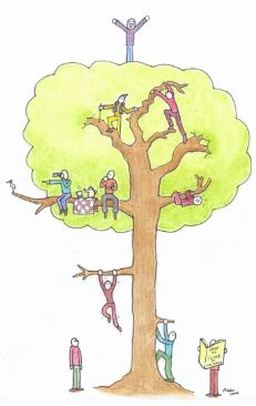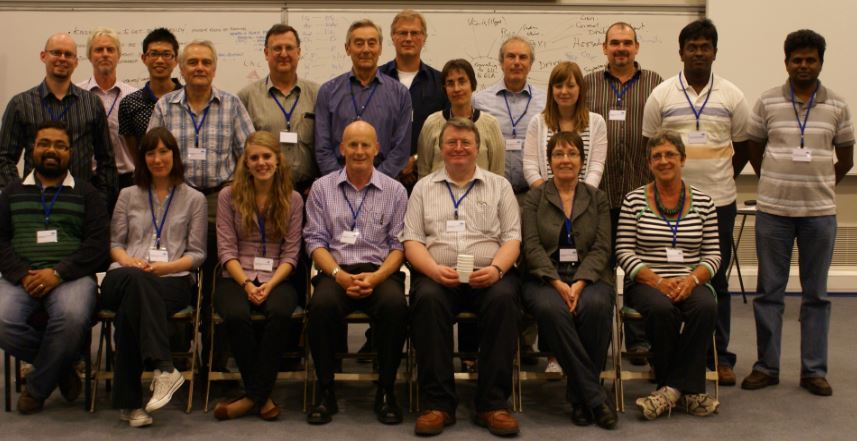Today's activity was all about exploring play.
We are inviting you to create a playful induction activity that can be used face-to-face or online when a new group of learners comes together. The main purpose is to get to know each other, to open up and lay the foundations of the learning community that is to be formed. The activity should enable the teacher/facilitator to participate.
There were some fantastic posts describing a range of activities all of which were engaging and looked like fun. Most of the contributions were about enabling students to share something about themselves - not surprisingly given it was an induction scenario. One post in particular by Karen Tuzylak talked about a scavenger hunt.. 'With our first years I set up a scavenger hunt around Crewe, this was to help them bond but also to help them to know the area. It is so much fun and after this the students had shared stories from their adventure'
This post triggered a very memorable experience while working at SCEPTrE in 2009 we used a similar approach as part of a professional Experiential Learning Academy. We called it the 'Guildford Edventure' and it was designed by friend and colleague Russ Law. It was not so much an induction or first time meeting of a group but located as an integral part of a two day immersive experience. Its purpose was to enable people who had not met before to get to know each other from doing something together so that they became a sort of team with shared understandings, purposes, goals and lived experiences through which they developed shared meanings that could later be reflected upon.
At the time Russ was developing the idea of explorativity - the orientation we have to explore places and things that are unknown to us. We wanted to provide participants with the opportunity to experience being explorative in a physical context and environment that was unfamiliar, with people they did not know, with a challenge they had never encountered before. We wanted them to think about how they felt with all this unfamiliarity while trying to accomplish tasks and challenges that had been set. I spent many weekends designing and testing my edventure which I conceived as a team-based explorative stroll through Guildford, solving riddles, performing tasks and reflecting on the experience.
.
The Guide he prepared is attached to this post and the basic idea for an educational edventure (edventure) can be adapted to any town or landscape. Participants were organised into groups of 4. They were provided with a map of Guildford town centre, briefed on the nature of the edventure and then given their edventure Guide.
The collective experience unfolded over the course of a couple of hours. I acted as an observer with a video camera and recorded some of the things participants did as we tracked or encountered each group.
We are inviting you to create a playful induction activity that can be used face-to-face or online when a new group of learners comes together. The main purpose is to get to know each other, to open up and lay the foundations of the learning community that is to be formed. The activity should enable the teacher/facilitator to participate.
There were some fantastic posts describing a range of activities all of which were engaging and looked like fun. Most of the contributions were about enabling students to share something about themselves - not surprisingly given it was an induction scenario. One post in particular by Karen Tuzylak talked about a scavenger hunt.. 'With our first years I set up a scavenger hunt around Crewe, this was to help them bond but also to help them to know the area. It is so much fun and after this the students had shared stories from their adventure'
This post triggered a very memorable experience while working at SCEPTrE in 2009 we used a similar approach as part of a professional Experiential Learning Academy. We called it the 'Guildford Edventure' and it was designed by friend and colleague Russ Law. It was not so much an induction or first time meeting of a group but located as an integral part of a two day immersive experience. Its purpose was to enable people who had not met before to get to know each other from doing something together so that they became a sort of team with shared understandings, purposes, goals and lived experiences through which they developed shared meanings that could later be reflected upon.
At the time Russ was developing the idea of explorativity - the orientation we have to explore places and things that are unknown to us. We wanted to provide participants with the opportunity to experience being explorative in a physical context and environment that was unfamiliar, with people they did not know, with a challenge they had never encountered before. We wanted them to think about how they felt with all this unfamiliarity while trying to accomplish tasks and challenges that had been set. I spent many weekends designing and testing my edventure which I conceived as a team-based explorative stroll through Guildford, solving riddles, performing tasks and reflecting on the experience.
.
The Guide he prepared is attached to this post and the basic idea for an educational edventure (edventure) can be adapted to any town or landscape. Participants were organised into groups of 4. They were provided with a map of Guildford town centre, briefed on the nature of the edventure and then given their edventure Guide.
The collective experience unfolded over the course of a couple of hours. I acted as an observer with a video camera and recorded some of the things participants did as we tracked or encountered each group.

Participants 'wandered with intent' or explorative purpose around Guildford, found their way from the graveyard on the hill, via the river Wey and the High Street to a pub or restaurant of their choice, discovering all sorts of things along the way. They solved riddles and answered questions, they paused to apply reflective questioning techniques learned earlier to apprehend their experiences more deeply. They were challenged to undertake some individual and group activities that they would not normally try, such as busking for passers-by before visiting a pub, trying a drink they’d never had before, and having an evening meal together choosing something they had not eaten before. Each group had its own pocket video camera, mobile phones and camera to record their experiences and insights and participants were encouraged, through the activities in the Guide, to be aware of the effects of their individual and collective experience on their emotions. Through these shared experiences and wanderings, something remarkable happened: people who had not known each other before became friends and worked as a team to solve puzzles, perform challenges and reflect on their experiences.
On the second day of Experiential Academy participants created their own digital stories describing their experiences and each team presented its own unique experience and shared the learning that had been gained through their edventure. By the end of the two day experience most participants claimed to have discovered aspects of themselves (and of others), that were life-changing, and that they would never forget, not least because they would apply their learning and new knowledge in the future. This was a powerful lesson for participants and facilitators on the educational value and potential in the practice of combining play and exploration in the service of being ‘explorative’ and for a bunch of people to learn to work together to achieve goals that they invested with meaning.
I am wondering how we would characterise such pedagogic practice where the teacher creates a scaffold for the edventure but gets out of the way while the social learning takes place but returns to help participants reflect on the experience and their learning to help them create further meaning. Sage on the stage, guide on the side and meddler in the middle does not really capture this sort of pedagogic practice.
Sources
Sadly all the videos we made of the Experiential Academy have been lost as SCEPTrE's YouTube channel has been deleted and all the content lost.. Something that causes me great pain as it was an amazing archive and legacy. You can find out about Russ Laws concept of explorativity in Lifewide Magazine LWM#18 January 2017 or visit Experiential Academy
Russ Law's Guidford Adventure Guide
On the second day of Experiential Academy participants created their own digital stories describing their experiences and each team presented its own unique experience and shared the learning that had been gained through their edventure. By the end of the two day experience most participants claimed to have discovered aspects of themselves (and of others), that were life-changing, and that they would never forget, not least because they would apply their learning and new knowledge in the future. This was a powerful lesson for participants and facilitators on the educational value and potential in the practice of combining play and exploration in the service of being ‘explorative’ and for a bunch of people to learn to work together to achieve goals that they invested with meaning.
I am wondering how we would characterise such pedagogic practice where the teacher creates a scaffold for the edventure but gets out of the way while the social learning takes place but returns to help participants reflect on the experience and their learning to help them create further meaning. Sage on the stage, guide on the side and meddler in the middle does not really capture this sort of pedagogic practice.
Sources
Sadly all the videos we made of the Experiential Academy have been lost as SCEPTrE's YouTube channel has been deleted and all the content lost.. Something that causes me great pain as it was an amazing archive and legacy. You can find out about Russ Laws concept of explorativity in Lifewide Magazine LWM#18 January 2017 or visit Experiential Academy
Russ Law's Guidford Adventure Guide
| guildford_edventure_2009.pdf |

 RSS Feed
RSS Feed